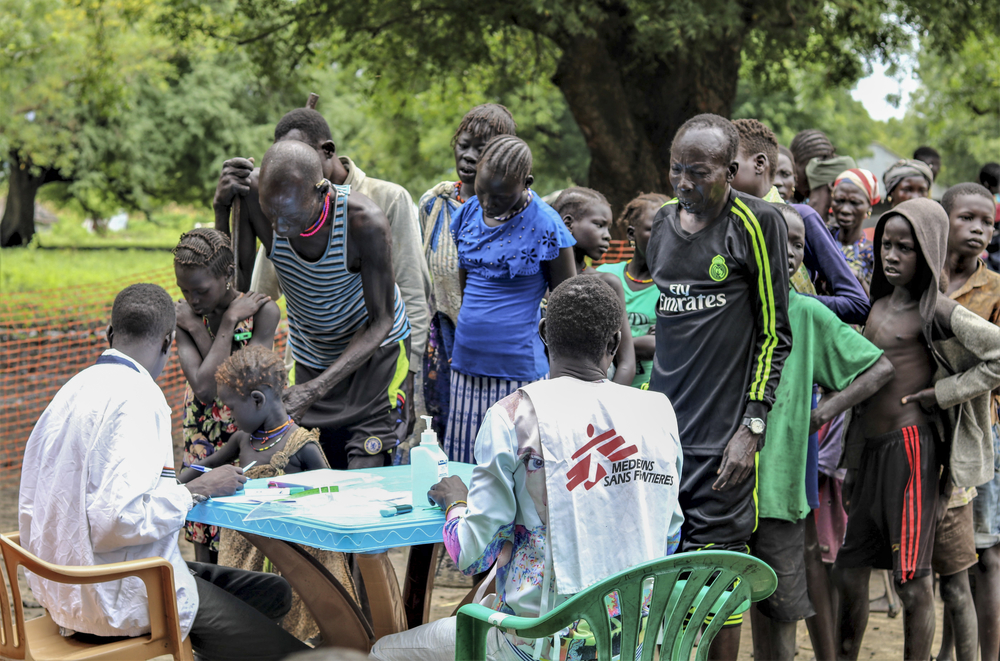Juba, South Sudan, 22 September 2020 - Médecins Sans Frontières/Doctors Without Borders (MSF) is deeply concerned about the impact of ongoing severe flooding in Greater Pibor, South Sudan, which has displaced thousands of people and worsened an already devastating humanitarian emergency. MSF is urging organisations in the area to scale up their response to prevent further disaster.
“When the fighting renewed [in June 2020], we fled to the bush with our cattle,” says Martha. “Forty cows were stolen, but we still have 60 more. Then the floods came and the remaining cattle died from a disease. Now everything is gone.”
Her six-month-old grandson, Kony, is recovering from cerebral malaria at an MSF clinic in Pibor town. Martha and her daughter-in-law carried Kony for two days from Neemach settlement to Pibor to reach medical services.
Swollen rivers and flooding are sweeping through communities in the Greater Upper Nile region at an alarming speed, for the second year in a row. Since July, the floods have displaced hundreds of thousands of people and left many more without reliable access to food and clean water. They are exposed to malaria, waterborne diseases, snakebites and food insecurity, as floodwaters overwhelm their homes and farms.
Today’s emergency is just another situation that is having a compounded effect on the local community
In Pibor town, where MSF is providing life-saving medical care, the humanitarian situation is becoming disastrous. In 2019, massive flooding devastated the area, forcing us to reduce our activities and discharge patients when the hospital and compound became completely submerged. Hostilities that resumed in the first half of 2020 have caused large-scale displacement, and the loss of lives and resources. After the security situation stabilised in August 2020, MSF re-launched an emergency intervention to respond to mass displacement due to conflict, opening a clinic in the only place in town that was not under water last year.
“This has been a hard 12 months for this community”, says Josh Rosenstein, MSF’s Deputy Head of Mission. “Multiple times MSF has responded to various emergencies, and once again our latest emergency response to conflict-related displacement is transforming into a flood response. Our focus is now on malaria, measles and flooding.”

MSF mobile clinic brings life-saving medical care to Lukurunyarg after flooding made the roads impassable. [© Tetiana Gaviuk/MSF ]
“Today we are reaching out to the community through our daily mobile clinics, treating the most severe illnesses,” adds Rosenstein. “We’re also implementing our flood contingency plan, which includes building additional flood defences around the clinic to ensure we can continue to provide medical services, as the water level is rising at an alarming speed.”
Today, the Pibor River has swelled so that the water is now in some area of Pibor, leaving parts of the town inaccessible. Many neighbourhoods cannot be reached by foot as the water is too high and a local ferry system is too expensive for many who live in the area. A mobile MSF team, made up of a clinical officer, a nurse and a health education officer, has been delivering medical care to prevent and treat the most serious health conditions in hard-to-reach areas.
“I can’t believe what my eyes have seen in Pibor – so much destruction of infrastructure and resources,” says Simon Peter Olweny, MSF’s water and sanitation coordinator in Pibor. “There is a lack of public toilets in the town. In our clinic, we have only two toilets and no space to build more to meet a minimum requirement for hundreds of patients we treat each day. These conditions are a breeding ground for diseases.”
MSF is worried by the worsening situation. Reoccurring local emergencies, the impacts of the global COVID-19 pandemic on the capacity of emergency assistance, and the growing food insecurity in the region are all cause for concern today and in the near future.
“Today’s emergency is just another situation that is having a compounded effect on the local community”, says Rosenstein. “The worst of the flooding is yet to happen, and the community is already feeling the strains of food insecurity. Lack of access to healthcare will only get worse over the coming weeks and months, and conditions will only grow more precarious for people.”
Since July, MSF has provided clean water, distributed 7,252 mosquito nets, treated 1,493 children under five with malaria and treated 79 patients with measles.
In a country with one of the highest rates of child illness and death, MSF is urging all organisations to mobilise resources and scale up their response in Greater Pibor, including food and other relief items, shelter, water and medical services, to help prevent the disastrous impact on people that was witnessed in October last year.
![Flooding in the Greater Pibor Administrative Area [© Tetiana Gaviuk / MSF] Flooding in the Greater Pibor Administrative Area](/sites/default/files/styles/hero_desktop/public/msfimages/news/msf334771_medium.jpg?itok=v2j4Bme7)